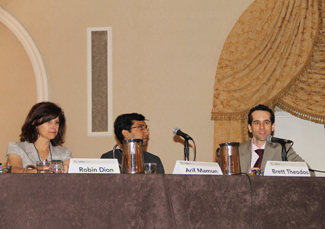
WASHINGTON, D.C.— During his keynote speech for the 16th Annual Welfare Research and Evaluation Conference, Jack Shonkoff, director of the Harvard Center on the Developing Child and chair of the committee that developed the groundbreaking 2000 report “From Neurons to Neighborhoods: The Science of Early Childhood Development,” called for a “new era in early childhood policy and practice.”
Summarizing numerous scientific studies, Shonkoff said “early experiences are built into our bodies … for better or for worse,” and that, after a certain point, severe and repeated adversity such as child neglect or abuse “has a wear and tear effect on the body.” This can lead to physical health conditions such as heart disease, substance abuse, anxiety disorders and diabetes, ultimately shortening a person’s life span.
 Currently, child-serving systems try to offer children and families enrichment opportunities such as access to good health care, nutrition, parent education and quality preschool, said Shonkoff. But it isn’t enough. Children who are most at risk need buffering from the sources of extreme adversity, he said. To make a significant difference for these children, we need to focus on the adults in their lives, he added.
Currently, child-serving systems try to offer children and families enrichment opportunities such as access to good health care, nutrition, parent education and quality preschool, said Shonkoff. But it isn’t enough. Children who are most at risk need buffering from the sources of extreme adversity, he said. To make a significant difference for these children, we need to focus on the adults in their lives, he added.
Shonkoff believes parents need capacity-building services in the form of active learning opportunities, such as coaching and mentoring. Many of the skills adults must master to provide a stable home environment for their children, such as impulse control, problem solving, stress management and cooperation with others, will also increase their employability, he said.
Shonkoff’s speech was one of several sessions at the conference, sponsored by the Office of Planning, Research and Evaluation in the Administration for Children and Families, U.S. Department of Health and Human Services (OPRE), focusing on child and youth well-being. Workshops and discussions today and tomorrow will cover working with pregnant teens and teen parents, subsidized jobs for youth and initiatives for youth aging out of foster care. Yesterday’s program also included talks on child care policy and strategies to support at-risk youth (see sidebar).
Over 800 participants pre-registered for the free conference and many more will watch live-streamed sessions. The event was intended to bring “members of the research community, policy makers, … program operators and practitioners together to hear about rigorous research that they can use when making program decisions or to develop policies and programs to address family poverty issues,” said Mark Fucello, director of the division of economic independence in OPRE.
Don Friedman, managing attorney for New York’s Empire Justice Center, who was attending the conference for the second year, described the event as “a gathering … of people who are very smart, very thoughtful and deeply engaged in policies affecting poor people, especially welfare policy.” He hoped the conference would help him “think about new ways to shape my advocacy and new things to advocate for at the state level, [as well as] new information to help bolster the arguments I make.”
The conference continues through Friday and many sessions can be viewed online.
Lisa Pilnik, JD, MS, is a freelance writer, consultant, and co-founder of Child & Family Policy Associates, a Maryland-based consulting firm.

























